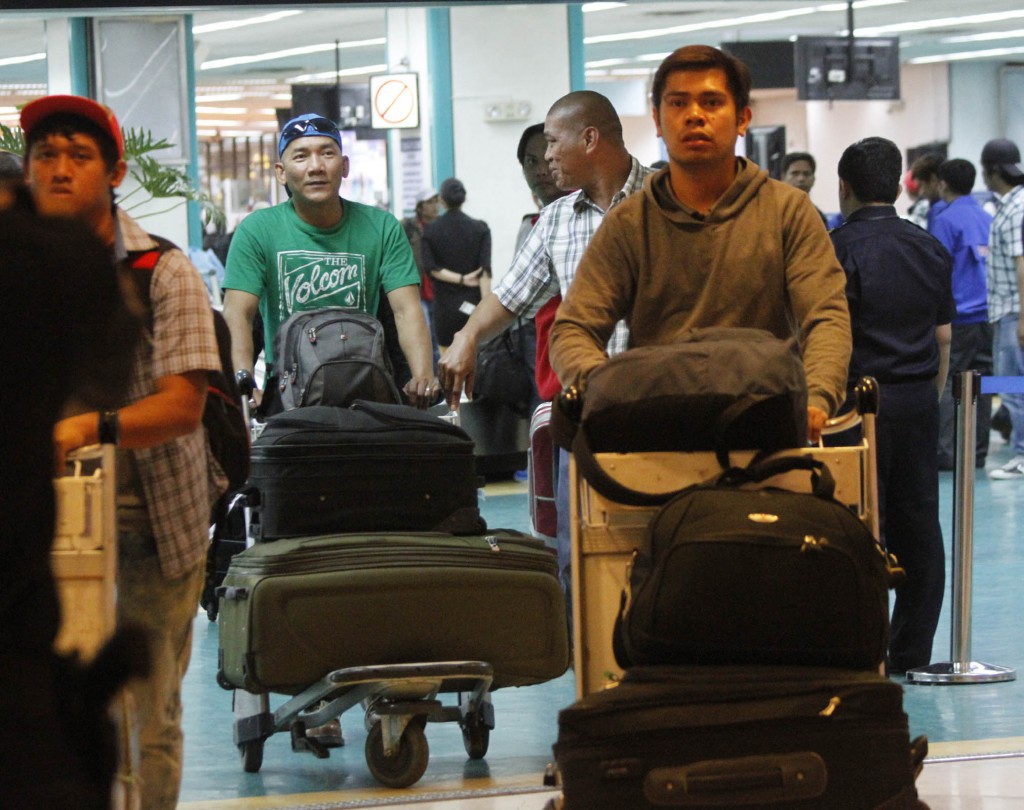Breaking
PHL pushes for more stringent measures to protect rights of Pinoy domestic workers

The 65 overseas Filipino workers (OFW) repatriated from Libya thru the effort of the Philippine government arrive at the Ninoy Aquino International Airport (NAIA) on Monday (June 23, 2014) in Pasay City. (PNA photos by Avito C. Dalan)
MANILA — As the Philippines has placed itself at the forefront of the global efforts to protect the rights and welfare of domestic workers locally and overseas,various problems still exist for overseas Filipino workers (OFWs) especially those working in countries which do not upheld or ratified the International Labor Organization’s (ILO) Convention 189 on Decent Work for Domestic Workers.
In an interview with Remedios “Remy” Borlongan, former president of Asian Domestic Workers Union-Hong Kong, she said that some migrant domestic workers remain exploited particularly in the Middle East.
“Most of them are being locked at home by their employers and given no right to form associations,” she shared.
However, in countries like Hong Kong, they are free to organize groups, voice out their rights and receive the same benefits like that of other kinds of workers, Borlongan said.
In the Philippines, through the government’s ratification of ILO Convention 189, domestic workers here and abroad makes them part of the workforce or have the same rights as that of other workers.
Uruguay was the first to ratify the treaty last June 2012 while the Philippines followed suit in the same year.
According to the Department of Labor and Employment (DOLE) Secretary Rosalinda Baldoz, “this puts the Philippines in a unique position with regards the entry into force of ILO Convention 189.”
Recognizing the rights of 53 million domestic workers worldwide, the Convention has set out standards for the benefit of domestic workers. It is stated in the Convention that domestic workers must enjoy the same basic rights as being experienced by other workers such as reasonable hours of work; weekly rest of at least 24 consecutive hours; a limit on in-kind payment; clear information on terms and conditions of employment, as well as respect for fundamental principles and rights at work including freedom of association and the right to collective bargaining.
In the Philippines, there are around 1.9 million Filipino migrant domestic workers.
Senator Pia Cayetano said that “close to 30 percent [of the said estimate] are excluded from national labor legislation, 45 percent have no entitlement to weekly rest periods or paid annual leave and more than third of women domestic workers have no maternity protection.”
Adding to the sad plight of domestic workers, Borlongan said that Filipinos applying as domestic workers abroad are being required by recruitment agencies to pay a high sum of around Php 100,000 inclusive of recruitment fee, medical fee, travelling fee, air ticket, contract fee, among others. An additional Php 28,000 is also needed for the payment of TESDA training, Borlongan added.
Such transactions are unrecorded as recruitment agencies do not give them receipts for these exorbitant payments, Borlongan noted.
The domestic worker/leader further cited that in 1986, she did not undergo such process and that according to Migrant Workers Act, a worker must only pay Php 5,000 to a recruitment agency as recruitment fee and Php 8,000 for TESDA training.
On the other hand, the Philippine Overseas Employment Administration (POEA) has been reiterating that recruitment agencies must not require domestic workers payment of any placement fee and other fees such as training fees, medical examination fees, video or photo fees, processing fees, boarding fee, and other services. The POEA has ordered preventive suspension and even shut down some recruitment agencies violating this policy.
“Payment for such fees through salary deduction by the employer abroad is a violation of “no placement” policy, POEA Administrator Hans Leo Cacdac said.
Once these domestic workers started working abroad, women OFWs even suffer a “double burden” as they are always the ones who experience exploitation, human trafficking, physical and emotional abuse, and other forms of violence against women especially in countries which do not recognize the rights of domestic workers.
Borlongan said providing more protection on women is needed as they are “more vulnerable” to abuses.
Some 117 countries around the world are employing domestic workers, around 83 percent of them women.
“I hope that the national legislation would give more attention to the plight of domestic workers particularly women as they are sometimes being neglected or somewhat ‘invisible’.
It makes them vulnerable to exploitation because there are not enough laws protecting them,” Borlongan said.
To date, the Philippine legislation is currently crafting a national law that will uphold the ILO’s Domestic Workers Convention No. 189 to further safeguard the rights and welfare of the country’s domestic workers.





















